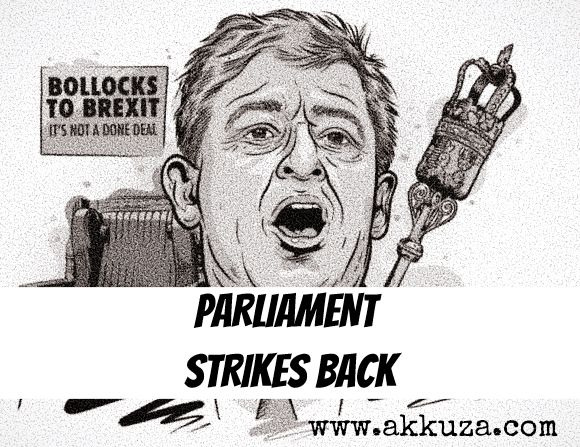Parliament Strikes Back

Speaker Bercow stood up and made a statement. He did so from his position within an old and respectable institution and what he said was firmly embedded and rooted in tradition. It was not tradition for the sake of tradition but rather the kind of tradition that forms part of an ongoing process of institutional development. The kind of tradition that gives direction, certainty and clarity.
Founding his position on a strong 415-year old rule fortified by precedent Bercow explained to the gathered members of the House that there could be no new meaningful vote unless there is a ‘new proposition that is neither the same nor substantially the same‘ as the previous ones. Erskine-May, that biblical volume(s) of reference on parliamentary procedure, was never intended to gather cobwebs; rather it was intended to be at the throbbing heart of an institution that has oftentimes been described as “the mother of all parliaments”. Rather than bellowing empty air, Bercow was the metatron – the channel of the divine voice – and in this case the divinity was the rule of the land that holds everything together.
I have often thought that it is a blessing that of all the EU Member States it was the United Kingdom that would go through the test phases of the process of leaving the European Union. As constitutional and representative mechanisms go there could be no better testing ground for the first time enactment of a multi-dimensional constitutional disentanglement to take place. The institutional self-awareness built over centuries of development and precedent should be able to withstand even the worst assault of today’s popular and populistic politicians.
That the ultimate distillation of all that is parliamentary representation would be severely put to test was a scripted inevitability. Once you had a parliament in session that overwhelmingly was against Brexit in principle but that was also tasked to go through the motions of trying to transform “the people’s will” (17 million reminder) into reality then it was clear that there would be a constant struggle to simply understand what the sovereign will ultimately was. I have dealt with one side of this conundrum in the post Unpopular Representation.
Add to this formula the internal party splits, the devolved interests (particularly Scot and Northern Irish) and the macchiavellian manoeuvering that would take place at a national level as well as the understandable negotiating limits with the European Counterparts then you would hope that as much as possible the institutional underpinnings of the process remain such as to guarantee the full purpose and functioning of a parliamentary democracy.
Bercow’s ruling ostensibly defends parliament (mostly backbenchers) from the actions of a “bullying” executive. May’s third attempt at pushing the “meaningful vote” (MV3) can not happen because it would be the third time too many of trying to get her own way by hook or by crook. The symbolic gesture of Bercow’s announcement is much more important than the practical consequences. I say that because there is always a workaround that is possible for May however any workaround that results in forcing the meaningful vote notwithstanding the Speaker’s warning risks taking on the wrong meaning of meaningful.
It is facile to impute motive to Bercow’s ruling. Truth is that the rule existed before Bercow. It has a purpose. In the wider picture we can see it as a safeguard against deception. An executive that attempts to “weaponize” time to force the hand of parliament is suddenly caught with its proverbial pants down. This could in effect be seen as a first step of parliament fighting back after it had lost a motion to wrestle the process from May’s hands earlier last week.
Returning to the issue of delegated and trustee representation we could see this kind of ruling as another pressure valve that sends a clear signal that on this particular issue – and unless some meaningful change is brought through (highly unlikely given the noises coming from Europe) – the matter might be slowly slipping out of the hands of the elected representatives themselves.
If they really want to fulfill their centuries old function of popular representation then they might want to realise that the mother of all parliaments is due a consultation with its people. If only to see whether their original mandate still stands given the new facts and circumstances that have arisen since the last popular vote.







